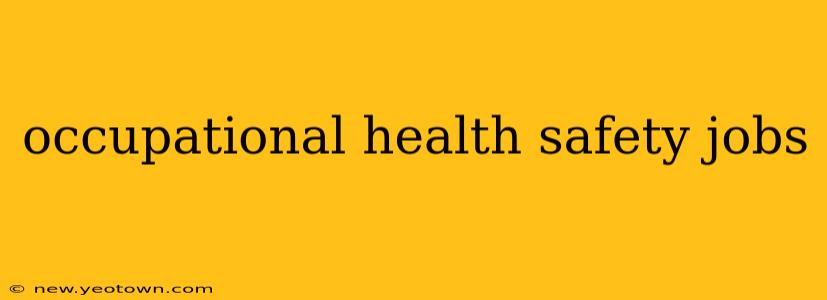The world of Occupational Health and Safety (OHS) is a dynamic and vital field, dedicated to protecting the well-being of workers across diverse industries. It's not just about putting up safety signs; it's about creating a culture of proactive risk management, fostering a safe and healthy work environment, and ultimately saving lives. If you're passionate about making a real difference and have a knack for problem-solving, a career in OHS might be the perfect fit. But what exactly does it entail, and what opportunities are out there? Let's explore.
What Does an Occupational Health and Safety Professional Do?
Imagine being the guardian of workplace well-being, the proactive problem-solver who identifies and mitigates risks before they cause harm. That's the essence of an OHS professional's role. Their responsibilities are multifaceted and can vary depending on the industry and the size of the organization. However, core duties frequently include:
- Risk Assessment and Management: This is the cornerstone of OHS. Professionals meticulously analyze workplaces to identify potential hazards – from slips and falls to exposure to hazardous materials – and develop strategies to eliminate or control these risks.
- Developing and Implementing Safety Programs: This involves creating and enforcing safety policies, procedures, and training programs tailored to the specific needs of the organization and its workforce.
- Conducting Safety Inspections and Audits: Regular inspections are crucial to ensure compliance with safety regulations and to identify any emerging hazards. OHS professionals often lead these inspections and report their findings.
- Investigating Accidents and Incidents: When incidents occur, OHS professionals play a vital role in investigating the root causes, identifying contributing factors, and implementing corrective actions to prevent recurrence.
- Providing Safety Training and Education: Equipping employees with the knowledge and skills to work safely is a paramount responsibility. This involves designing and delivering training programs on various safety topics.
- Maintaining Safety Records and Documentation: Meticulous record-keeping is essential for compliance and continuous improvement. OHS professionals are responsible for maintaining accurate records of safety inspections, training, incidents, and other relevant data.
What are the Different Types of Occupational Health and Safety Jobs?
The OHS field offers a wide range of career paths, catering to diverse interests and skill sets. Some common roles include:
- Safety Officer/Manager: This is a generalist role encompassing most of the responsibilities outlined above. The level of responsibility increases with seniority.
- Health and Safety Consultant: These professionals provide expert advice and support to organizations on all aspects of OHS management. They often work independently or for consulting firms.
- Environmental Health and Safety Specialist (EHS): This role integrates environmental considerations into OHS, focusing on the broader impact of workplace activities on the environment.
- Ergonomist: These specialists focus on designing workplaces and tasks to minimize physical strain and injuries.
- Industrial Hygienist: These professionals specialize in identifying and controlling workplace hazards related to chemical, biological, and physical agents.
What Qualifications Do I Need for an Occupational Health and Safety Job?
The specific educational requirements can vary depending on the role and location, but generally, a bachelor's degree in OHS, safety engineering, or a related field is highly advantageous. Many professionals also hold relevant certifications, such as those offered by the Board of Certified Safety Professionals (BCSP). Experience is invaluable, and many employers value practical experience gained through internships or entry-level positions.
What is the Salary Range for Occupational Health and Safety Jobs?
Salary expectations vary considerably based on experience, location, industry, and the specific role. Entry-level positions may offer a lower salary, while experienced professionals in senior roles can command significantly higher earnings. Researching average salaries for your specific location and desired role is recommended.
What are the Career Prospects in Occupational Health and Safety?
The demand for qualified OHS professionals is consistently strong, driven by a growing awareness of the importance of workplace safety and increasingly stringent regulations. Career prospects are generally excellent, with opportunities available across a wide range of industries.
How Can I Get Started in an Occupational Health and Safety Career?
Your journey into OHS can begin with research. Explore different educational paths, identify areas of interest within the field, and network with professionals in the industry. Consider internships or volunteer opportunities to gain practical experience and build your network.
This is a field where your dedication directly translates into positive impact. If you're ready to make a difference, the world of Occupational Health and Safety awaits.

